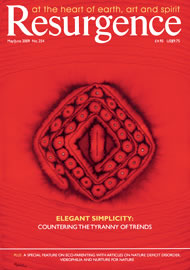THIS BOOK IS a greatly extended version of Deschooling Our Lives, which was published in 1996. As well as a wide range of critical writing and analyses of traditional education, it now includes examples of alternative or experimental schools in Israel, Turkey, India and Mali as well as well-known American schools such as Sudbury Valley and Albany Free School. It is good to see The Small School (founded by Resurgence editor Satish
Kumar) and Summerhill in there.
Matt Hern is a respected alternative educator and directs the Purple Thistle Centre in Vancouver, which is not an alternative school but a public learning collective. He introduces his new book with the Foreword that Ivan Illich, who died in 2002, wrote for the earlier version and it is somehow shocking to read in Illich’s piece about the gathering of alternative education ‘greats’ – Paolo Freire, John Holt, Paul Goodman, Jonathan Kozol and others – at Cuernavaca in 1970. Their brief was to address what Illich then called “the futility of schooling” and their deliberations resulted in Illich’s revolutionary book Deschooling Society, published the following year. Why shocking? Because most of these great educators are now dead, and because their ideas and vision which held out the hope of emancipation for every child have made so little impact on the state education systems of Britain and America.
John Taylor Gatto, one of the contributors to this book and a trenchant critic of the American school system which he knows well as a teacher in New York public schools, would be unsurprised at this lack of impact. In his view and in the view of his fellow writers, the nations’ schools have increasingly become places that stifle creativity and encourage compliance and conformity of thought. They are huge, impersonal, authoritarian places denying the interests and real needs of students as well as their active engagement in the democratic governance of their school community. In these institutions a ‘one size-fits-all’ approach to learning, geared to passing exams, reduces the capacity of young people to learn and quenches the delight in learning that is natural in most children.
This critique of traditional schooling is familiar to many people in the UK. But is the answer to ‘deschool’ or ‘home educate’ or even to set up your own alternative independent school? In England one response is to buy into ‘progressive’ education which offers greater freedom and creativity. But this is an option only for the few. Hern in his contribution is quite clear about the need to make alternatives to traditional education available to everyone. If the innovative schools and exciting alternatives to school that are described in this book become the preserve of “some cool families with interesting ideas”, and deschooling is seen as “just another lifestyle option for the most privileged people in world history” then alternative education could end up as another “brick in the wall of white privilege”.
Hern has a vision of education that could provide the answer to the massive, over-centralised, over-bureaucratised places we now call schools. While an admirer of the home schooling movement, he believes that young people need places where they will meet people who are unlike them and where they encounter ideas and values that are different from their own. He calls these places “counter institutions”. Supported by a network of learning centres, community projects, libraries, parks, gyms, museums and playgrounds and involving parents and other adults, these places of learning would offer to young people a form of education that is responsive to their own needs and interests. As Hern says, “it just can’t be right to have kids stuck inside institutions, confined to classrooms of thirty peers for five days a week, six hours a day, ten months a year for twelve years of their childhood.”
Hern doesn’t emphasise the part that new computer technologies could play in releasing young people from this incarceration – although the young people whose comments provide a welcome feature in this book certainly do. By providing the practical means of connecting individual learners to their areas of interest and to the methods of learning best suited to them, these technologies could become the lever that brings to an end the era of monopoly education. In 1971, Illich talked about “learning webs”: networks which would provide learners with free access to resources for learning and thus bring down the “pyramid of classified packages” known as the school curriculum. In 2009 we have the internet. Illich would have welcomed its potential for liberation.
Mary Tasker is Chair of the Human Scale Education movement.






